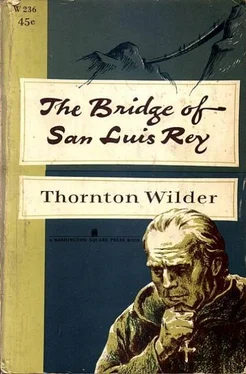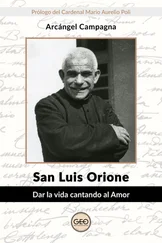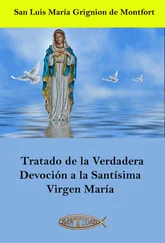A few of Pepita’s trials were physical: for example, the servants in the house took advantage of Doña María’s indisposition; they opened up the bedrooms of the palace to their relatives; they stole freely. Alone Pepita stood out against them and suffered a persecution of small discomforts and practical jokes. Her mind, similarly, had its distresses: when she accompanied Doña María on her errands in the city, the older woman would be seized with the desire to dash into a church, for what she had lost of religion as faith she had replaced with religion as magic. “Stay here in the sunlight, my dear child; I shall not be long,” she would say. Doña María would then forget herself in a reverie before the altar and leave the church by another door. Pepita had been brought up by Madre María del Pilar to an almost morbid obedience and when after many hours she ventured into the church and made sure that her mistress was no longer there, still she returned to the street corner and waited while the shadows fell gradually across the square. Thus waiting in public she suffered all the torture of a little girl’s self-consciousness. She still wore the uniform of the orphanage (which a minute’s thoughtfulness on the part of Doña María could have altered) and she suffered hallucinations wherein men seemed to be staring at her and whispering—nor were these always hallucinations. No less her heart suffered, for on some days Doña María would suddenly become aware of her and would talk to her cordially and humorously, would let appear for a few hours all the exquisite sensibility of the Letters; then, on the morrow she would withdraw into herself again and, while never harsh, would become impersonal and unseeing. The beginnings of hope and affection that Pepita had such need to expend would be wounded. She tiptoed about the palace, silent, bewildered, clinging only to her sense of duty and her loyalty to her “mother in the Lord,” Madre María del Pilar, who had sent her there.
* * *
Finally a new fact appeared that was to have considerable effect on the lives of both the Marquesa and her companion: “ My dear mother,” wrote the Condesa, “the weather has been most exhausting and the fact that the orchards and gardens are in bloom only makes it the more trying. I could endure flowers if only they had no perfume. I shall therefore ask your permission to write you at less length than usual. If Vicente returns before the post leaves he will be delighted to finish out the leaf and supply you with those tiresome details about myself which you seem to enjoy so. I shall not go to Grignan in Provence as I expected this Fall, as my child will be born in early October.”
What child? The Marquesa leaned against the wall. Doña Clara had foreseen the exhausting importunities that this news would waken in her mother and had sought to mitigate them by the casualness of her announcement. The ruse did not succeed. The famous Letter XLII was the answer.
Now at length the Marquesa had something to be anxious about: her daughter was to become a mother. This event, which merely bored Doña Clara, discovered a whole new scale of emotions in the Marquesa. She became a mine of medical knowledge and suggestion. She combed the city for wise old women and poured into her letters the whole folk-wisdom of the New World. She fell into the most abominable superstition. She practiced a degrading system of taboos for her child’s protection. She refused to allow a knot in the house. The maids were forbidden to tie up their hair and she concealed upon her person ridiculous symbols of a happy delivery. On the stairs the even steps were marked with red chalk and a maid who accidentally stepped upon an even step was driven from the house with tears and screams. Doña Clara was in the hands of malignant Nature who reserves the right to inflict upon her children the most terrifying jests. There was an etiquette of propitiation which generations of peasant woman had found comforting. So vast an army of witnesses surely implied that there was some truth in it. At least it could do no harm, and Perhaps it did good. But the Marquesa did not only satisfy the rites of paganism; she studied the prescriptions of Christianity as well. She arose in the dark and stumbled through the streets to the earliest Masses. She hysterically hugged the altar-rails trying to rend from the gaudy statuettes a sign, only a sign, the ghost of a smile, the furtive nod of a waxen head. Would all be well? Sweet, sweet Mother, would all be well?
At times, after a day’s frantic resort to such invocations, a revulsion would sweep over her. Nature is deaf. God is indifferent. Nothing in man’s power can alter the course of law. Then on some street-corner she would stop, dizzy with despair, and leaning against a wall would long to be taken from a world that had no plan in it. But soon a belief in the great Perhaps would surge up from the depths of her nature and she would fairly run home to renew the candles above her daughter’s bed.
At last the time came to satisfy the supreme rite of Peruvian households looking forward to this event: she made the pilgrimage to the shrine of Santa María de Cluxambuqua. If there resided any efficacy in devotion at all, surely it lay in a visit to this great shrine. The ground had been holy through three religions; even before the Incan civilization distraught human beings had hugged the rocks and lashed themselves with whips to wring their will from the skies. Thither the Marquesa was carried in her chair, crossing the bridge of San Luis Rey and ascending up into the hills toward that city of large-girdled women, a tranquil town, slow-moving and slow-smiling; a city of crystal air, cold as the springs that fed its many fountains; a city of bells, soft and musical, and tuned to carry on with one another the happiest quarrels. If anything turned out for disappointment in the town of Cluxambuqua the grief was somehow assimilated by the overwhelming immanence of the Andes and by the weather of quiet joy that flowed in and about the sidestreets. No sooner did the Marquesa see from a distance the white walls of this town perched on the knees of the highest peaks than her fingers ceased turning the beads and the busy prayers of her fright were cut short on her lips.
She did not even alight at the inn, but leaving Pepita to arrange for their stay she went or, to the church and knelt for a long time patting her hands softly together. She was listening to the new tide of resignation that was rising within her. Perhaps she would learn in time to permit both her daughter and her gods to govern their own affairs. She was not annoyed by the whispering of the old women in padded garments who sold candles and medals and talked about money from dawn to dark. She was not even distracted by an officious sacristan who tried to collect a fee for something or other and who, from spite, made her change her place under the pretext of repairing a tile on the floor. Presently she went out into the sunshine and sat on the steps of the fountain. She watched the little processions of invalids slowly revolving about the gardens. She watched three hawks plunging about the sky. The children who had been playing by the fountain stared at her for a moment, and went away alarmed, but a llama (a lady with a long neck and sweet shallow eyes, burdened down by a fur cape too heavy for her and picking her way delicately down an interminable staircase) came over and offered her a velvet cleft nose to stroke. The llama is deeply interested in the men about her, is even fond of pretending that she too is one of them and of inserting her head into their conversations as though in a moment she would lift her voice and contribute a wan and helpful comment. Soon Doña María was surrounded by a number of these sisters who seemed on the point of asking her why she clapped her hands so and how much her veiling cost a yard.
Читать дальше












